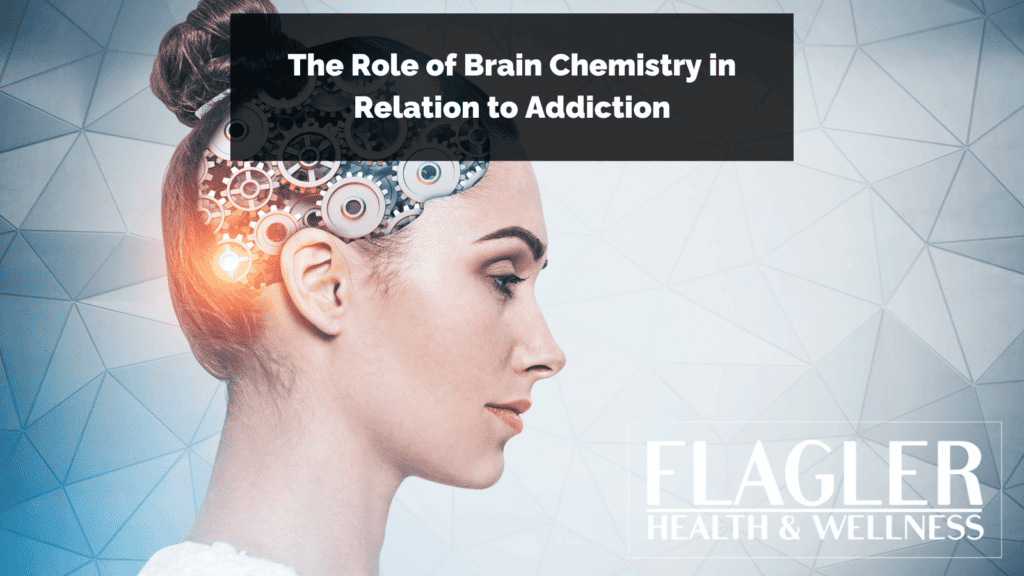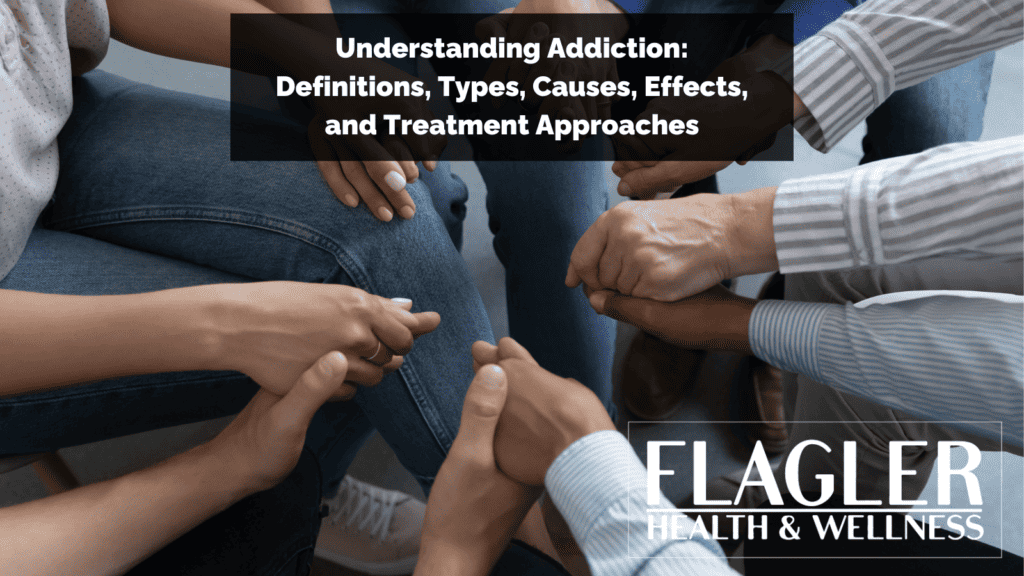Addiction is a complex and multifaceted disorder that significantly impacts brain function and behavior. This condition arises from a combination of genetic, environmental, and psychological factors, with brain chemistry playing a central role.
At its core, addiction alters the brain’s reward system and neurotransmitter levels, leading to compulsive behaviors and a high potential for relapse. There is an intricate relationship between brain chemistry and addiction, underscoring how important it is to explore how changes in neurotransmitters underpin addictive behaviors, and to understand how the brain adapts during treatment and recovery.
The Impact of Addiction on Brain Chemistry
Brain chemistry refers to the complex network of chemicals and processes that enable brain function, including mood regulation, decision-making, and responses to stimuli. Neurotransmitters, the chemical messengers of the brain, play a crucial role in these processes. They facilitate communication between neurons (brain cells) across synapses (gaps between neurons).
Drugs and alcohol interact with the brain’s communication system, disrupting the way neurons send, receive, and process signals. Many addictive substances mimic natural neurotransmitters, albeit with more intense effects, while others block or enhance neurotransmitter release, leading to altered perception, mood, and behavior.
How Does Drug Affect Communication in the Brain?
Substances can exaggerate or inhibit normal brain communication by interfering with neurotransmitters’ natural flow. For instance, they may overstimulate the “reward circuit” of the brain, creating a euphoric effect that users seek to repeat, laying the groundwork for addiction.
Neuroplasticity and Addiction
Addiction induces changes in the brain’s structure and function, a phenomenon known as neuroplasticity. Repeated substance use reinforces the neural pathways associated with drug use, making the desire to use the substance stronger and recovery more challenging.
Changes in Neurotransmitter Levels
Chronic substance use disrupts the balance of neurotransmitters, leading to long-term changes in the brain’s reward system, stress response, and ability to make decisions. This imbalance contributes to the compulsive nature of addiction and the difficulty of overcoming it.
Different Drugs and the Neurotransmitter They Affect
The following are different drugs and the neurotransmitters they affect:
- Opioids: Opioid drugs such as heroin, morphine, fentanyl, and oxycodone mimic endorphins, which are the body’s natural painkiller. Opioid drugs bind to opioid receptors in the brain, reducing pain and increasing sensations of pleasure, leading to dependency and ultimately, addiction with repeated use.
- Stimulants: Stimulant drugs such as cocaine, Adderall, and methamphetamine increase dopamine levels in the brain, which enhances feelings of euphoria, alertness, and energy. Although stimulants can improve attention and energy in the short term, their long-term use can lead to serious health issues, including heart problems, anxiety, and addiction.
- Depressants: Depressant drugs such as alcohol and benzodiazepines enhance the effect of GABA, a neurotransmitter responsible for relaxation and sedation. Although depressants can reduce anxiety and induce sleep, their misuse can lead to memory problems, low blood pressure, and respiratory depression. Dependency can develop quickly, with withdrawal symptoms being particularly challenging to manage.
- Hallucinogens: Hallucinogenic drugs like LSD affect serotonin levels, altering perception and mood. The use of hallucinogens can result in profound changes in perception and mood, sometimes causing experiences that are enlightening or terrifying. The effects can be unpredictable and vary greatly depending on the individual’s mindset, overall wellbeing, and environment at the time of use.
Recovery and Brain Chemistry
Recovery from addiction involves a complex process of restoring brain chemistry to its pre-addiction state. This journey is characterized by significant changes in the brain’s structure and function, particularly within the neural pathways associated with reward, motivation, and memory. As substances are eliminated from the body, the brain begins to adjust to the absence of drugs or alcohol, leading to withdrawal symptoms that reflect the brain’s dependence on these substances for neurotransmitter regulation.
The National Institute on Drug Abuse (NIDA) emphasizes that recovery is not just about stopping substance use but also involves the brain healing and relearning how to function without the influence of addictive substances. During this period, neuroplasticity plays a crucial role, as the brain’s ability to adapt and reorganize itself can aid in overcoming addiction. Recovery is a multifaceted process that encompasses physical, psychological, and emotional healing, underscoring the importance of integrated treatment approaches that address both the neurochemical and behavioral aspects of addiction.
How Does the Brain Respond to Withdrawal?
The brain responds to withdrawal by showing symptoms like increased craving and sleep disturbances.. This happens because the brain must readjust to the absence of the substance. This process can be painful and challenging, as the brain’s chemistry slowly returns to its pre-addiction state, a necessary step in the recovery journey. This adjustment period can manifest in several ways:
- Disruption in Neurotransmitter Balance: The immediate cessation of substance use can lead to an imbalance in neurotransmitters, as the brain has become accustomed to the presence of the substance to maintain chemical balance.
- Emergence of Withdrawal Symptoms: These symptoms can range from physical discomforts such as nausea, headaches, and tremors to psychological symptoms like anxiety, depression, and irritability. The specific symptoms experienced can vary based on the substance from which the individual is withdrawing.
- Changes in Reward System: The brain’s reward system may become less responsive, leading to decreased feelings of pleasure in everyday activities. This is due to the reduction in dopamine levels previously heightened by substance use.
- Increased Cravings: As the brain readjusts, cravings for the substance can intensify, driven by the brain’s memory of the substance’s effects on the reward system.
- Adaptation and Neuroplasticity: Over time, the brain begins to adapt to the absence of the substance, a process facilitated by neuroplasticity. This adaptation can lead to a gradual restoration of normal brain function and chemistry, though this can take time and may require support through medical treatment and therapy.
- Potential for Relapse: Due to the intense nature of withdrawal symptoms and cravings, there is a heightened risk of relapse during the withdrawal phase. Supportive care, treatment, and strategies to manage cravings are crucial during this period.
- Sleep Disturbances: Many individuals experience changes in sleep patterns, including insomnia or excessive sleepiness, as the brain works to regulate its natural sleep-wake cycle without the influence of substances.
- Emotional Volatility: The process of withdrawal can also lead to emotional instability, with individuals experiencing rapid mood swings, aggression, or periods of profound sadness.
Understanding the brain’s response to withdrawal is essential for developing effective treatment and support strategies, ensuring that individuals navigating the recovery journey are provided with the resources and care necessary to overcome the challenges of this critical phase.
What are the Effects of Addiction on Other Body Organs?
Asides from the brain, addiction can have widespread effects on various organs and systems throughout the body. The specific effects depend on the substance of abuse, the duration and severity of addiction, and individual factors such as genetics and overall health. Here are some common effects of addiction on different body organs:
- Heart: Substance abuse can have significant cardiovascular effects, including increased heart rate, elevated blood pressure, and irregular heart rhythm (arrhythmia).
- Lungs: Smoking or inhaling drugs can damage the lungs and respiratory system, leading to conditions such as chronic obstructive pulmonary disease (COPD), bronchitis, and lung cancer.
- Liver: Alcohol and certain drugs, such as opioids and acetaminophen, can cause liver damage and lead to conditions such as fatty liver disease, alcoholic hepatitis, and cirrhosis.
- Kidneys: Substance abuse can impair kidney function and lead to conditions such as acute kidney injury, chronic kidney disease, and kidney failure.
Can Addiction Be Cured?
No, but it can be treated. Addiction is considered a chronic, relapsing disorder that can be effectively managed with comprehensive treatment approaches that include medical, psychological, and social support.
What Causes Addiction?
Addiction results from a combination of genetic, environmental, and personal factors. Brain chemistry plays a significant role, with changes in neurotransmitter levels contributing to the development and continuation of addictive behaviors.
Does Brain Chemistry Affect Addiction?
Yes. Brain chemistry is central to the development, persistence, and recovery from addiction. The interaction between drugs and neurotransmitters and the resulting changes in brain function are fundamental to understanding addiction’s grip on individuals.
How We Can Help You
Recognizing the need for help is the first step on the road to recovery. The second is to find the right treatment program that suits your needs. At Flagler, we offer specialized programs that are tailored to the individual, ensuring the highest chance of your success. Remember, seeking help is not a sign of weakness, but rather one of strength and self-awareness. Reach out to us today to see how we can help you on your journey to a brighter, substance-free future.
Share This Post







